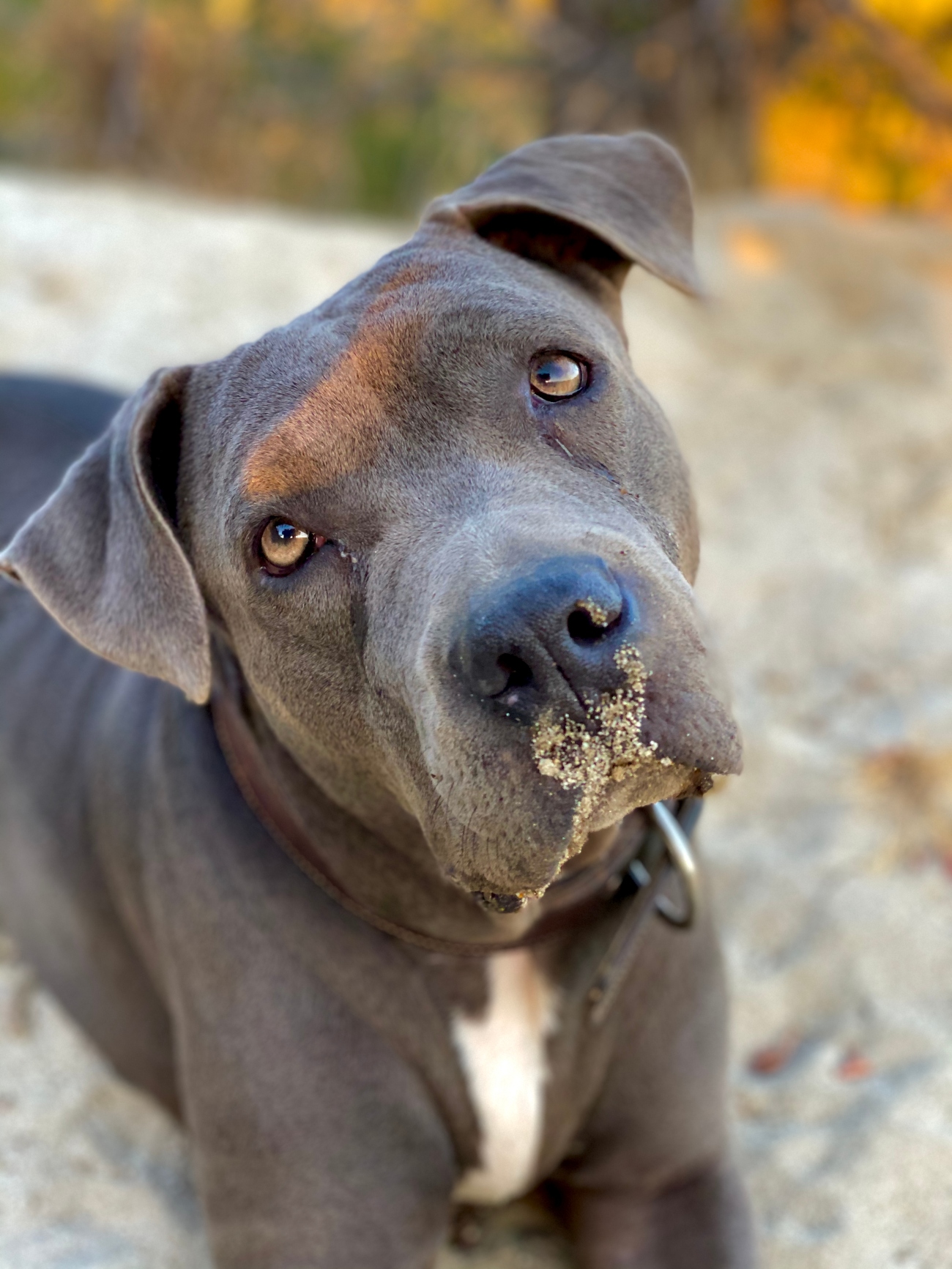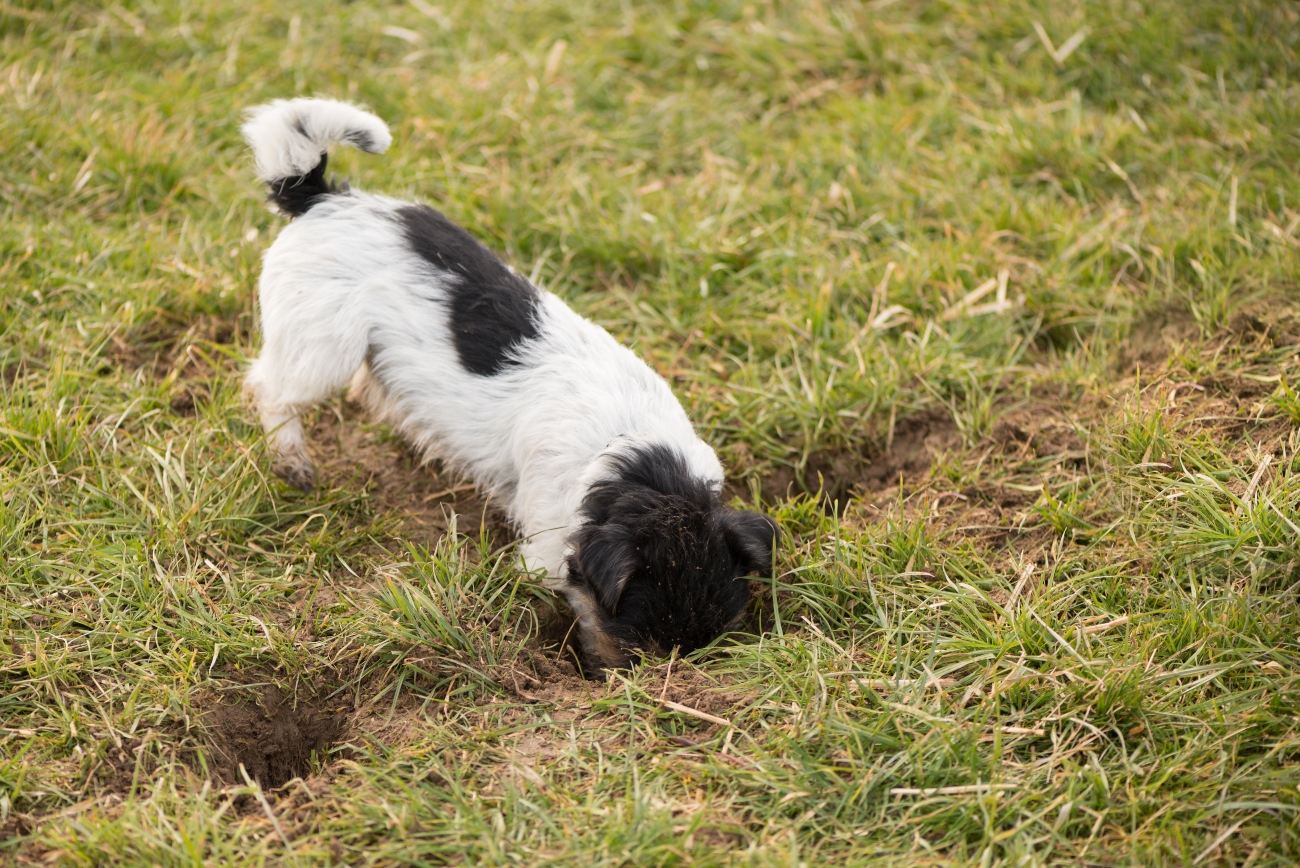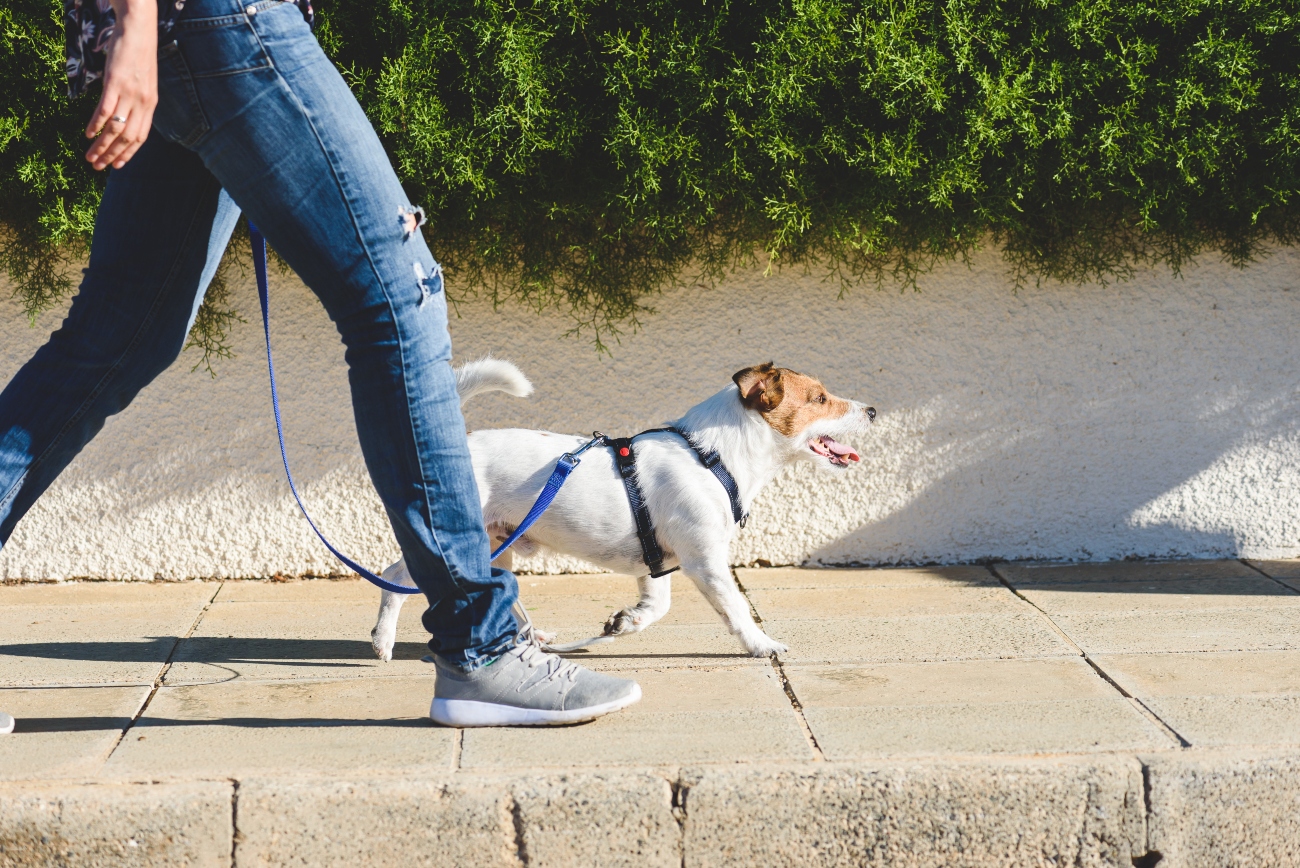
Why is my old dog suddenly eating dirt?
26th August, 2022
Let’s look at why senior canines start eating foreign objects, what it means and how to stop it.
You may have been out on a walk with your dog recently – and noticed a strange thing occurring. Your canine chum stops on the walk, sniffs at, and gobbles down something they shouldn’t – a stick, a rock or maybe even some dirt.
This behaviour probably had you scratching your head in bewilderment. Why would they do that?
Well, there are two things to note about this kind of behaviour. Firstly, it’s not all that uncommon; secondly, for various reasons, it should always be stopped.
Eating dirt and other foreign bodies: the background
Consuming objects other than food is not uncommon in dogs. It’s an eating disorder known as pica.
There’s a specific form of pica, known as geophagia, in which dogs eat dirt or mud. Then there’s also coprophagia, in which an animal consumes poo – either its own or that of another.
All of these behaviours should be looked at by a vet. Treatment – or correcting the behaviour – is generally simple.
There may be times when what they have eaten has caused them harm, and in some cases a medical procedure may be necessary to remove the foreign body and make sure there are no lasting effects.
If you have pet insurance for senior dogs you don’t have to delay taking your friend to the vet.
Why do dogs eat dirt?

Generally, there are three possible causes for your dog consuming dirt or other unwelcome objects – their mental health, their diet, or their medical condition.
Mental health
Your dog eating dirt may be a sign that something is not quite right with their mood or mental health generally.
Dogs can easily get bored if they’re not getting enough attention, exercise or stimulus. Eating dirt, odd as it may seem, can be a reaction to this boredom – just something to do to pass the time.
If you think this might be the cause of your dog’s behaviour, you may want to try and add a little more stimulus into their daily routine.
Different dog breeds require different amounts of stimulus and company. If you’re not quite sure where to start when it comes to increasing your older dog’s exercise quota, you may find our article on the best exercises for older dogs helpful.
Anxiety can also be a cause of this strange new behaviour. Dogs that are suffering from separation anxiety, due to being separated for too long from their owners, can start eating dirt in an attempt to manage stress.
Separation anxiety can be displayed in other different ways besides eating dirt. These include:
- Anxiety before you leave the house. They may drool or pant; they may also pace restlessly, tremble, or hide themselves away.
- Destructive or antisocial behaviours while you are away. These can include house soiling, destructive behaviour (chewing sofas and carpets), and repeated barking.
- Refusing to eat when they’re left alone. If your dog is turning away from its food, here are a few things you can try.
If your dog is displaying these behaviours, it’s definitely worth getting them looked at by a vet. This is because there is a chance that something else, other than separation anxiety, is causing them to act this way.
For instance, if they’re regularly soiling the house, it’s possible that there is a more serious health condition. Your pet insurance for senior dogs may be able to help with the costs of treatment if it’s needed. Check out what’s included now.
For more information on how to deal with separation anxiety, read our blog post on behavioural problems in older dogs.
The RSPCA website also has some useful advice on treating separation anxiety.
Diet
Is your dog getting all the nutrients they need? Some dog foods are better than others at supplying all the nutrients required by a healthy adult dog. If your dog is not getting enough of something, they may start eating dirt to make up for this shortfall.
This is particularly the case with minerals such as sodium, iron, and calcium, which are present in varying quantities in dog foods.
These minerals are also present in the soil, so if your dog isn’t getting them from their wet or dry food, they may start eating dirt to compensate.
How do you know which dog foods contain the right nutrient mix? A good rule of thumb is to look for the word ‘complete’. If a particular brand is marketed as ‘complete dog food’ or ‘complete balanced food’, this means it contains the nutrients a dog needs.
This is different from ‘complementary’ dog food, which can be given to your dog alongside a complete food – but which isn’t enough on its own.
Has your dog got bright eyes, lots of energy, and a shiny, dandruff-free coat? Then their diet is probably okay. If not, consider what they’re eating.
They should have no excess body fat – so you can feel their ribs. Finally, if they’re getting a balanced diet, they will be producing firm, brown stools.
Medical condition
There are several medical issues that can cause a dog to start eating dirt. Some of these will require treatment, so make sure you have pet insurance for senior dogs in place to help towards the cost of treatment.
These medical issues include:
Gastritis
This is where the lining of the stomach becomes inflamed. This results in an upset stomach. Dogs suffering from gastritis may eat dirt or grass to try to make themselves sick. Check out our blog on 11 things to give your dog with an upset stomach for some tips with coping with a dog that is struggling with this.
Anaemia
A low red blood cell count. Anaemia can have a variety of causes, including fleas, ticks, hookworms, bleeding disorders, and cancer. Fleas and ticks both suck blood from their host animal, and both are a common cause of anaemia in dogs.
There are plenty of flea and tick treatments out there, either in the form of spot-on administration, tablets, or collars.
Elsewhere, hookworms are more common in puppies than in older dogs. Puppies can absorb these parasites through their mother’s milk. However, hookworms can affect dogs of any age.
Stop infestations by applying regular worming treatments, and always cleaning up quickly after your dog.
Portosystemic (Liver) Shunt
Blood from the abdominal organs (such as the stomach and small and large bowels) bypass the liver and are diverted straight to the heart. This means that the liver doesn’t get enough blood to function properly.
In a normal dog, nutrients and toxins pass through the liver, which stores some of the food for energy and uses some of it to make proteins and other substances. Any toxins, meanwhile, are processed so that they can be safely passed through the rest of the body.
However, in a shunt, toxins build up in the bloodstream because the liver has not dealt with them. What’s more, the liver also won’t be processing the food into energy, which means that the animal will often feel hungry or sluggish.
Growth can also be affected.
Eating dirt can be a way in which dogs make up for this apparent lack of food and energy.
Should I worry if my dog is eating dirt?
Yes. This habit may seem innocent enough – but it can bring with it a number of problems.
Choking
Eating anything solid – including chunks of dirt, mud, small rocks or other foreign bodies – can put your dog at risk of choking. If this does occur, you need to remove the obstruction as quickly as possible.
Be careful, though, as choking will be an alarming experience for your dog, and they may panic and bite. The PDSA website has some great step-by-step advice on how to deal with a choking dog.
Your dog also runs a risk of breaking their teeth by chewing and consuming hard objects such as rocks or animal bones.
Dental problems are not uncommon in senior dogs: it’s well worth checking whether your pet insurance for senior dogs includes an allowance for dental treatment.
Petwise policies cover dental treatment as standard.
Gastrointestinal obstructions
If they do get past the mouth and throat in the first place, dirt, rocks, sticks, or other foreign bodies can get lodged in an animal’s oesophagus, stomach, or intestines. This is known as gastrointestinal obstruction.
This can be quite serious, and surgery is often required.
If they show any of the following behaviours, your dog may have something lodged in their internal organs:
- Coughing
- Gagging or regurgitating
- Abdominal pains
- Loss of appetite and lethargy
- Vomiting food or water, soon after they have eaten or drank
Much as with choking above, the essential here is to act quickly. If you notice your dog ingesting anything such as dirt, rocks or sticks, you should contact your vet immediately.
The vet may want you to bring your dog in so that they can try to induce vomiting, in order to get the object out.
Eating toxins
Eating dirt or grass brings with it another, potentially major risk for your dog. This is the danger of ingesting pesticides, fertilisers, or other toxins that may be present in the soil or grass.
If you think your dog has eaten dirt or grass from a lawn or field that may have been treated with fertiliser or pesticide, you should call the Animal Poison Line on 01202 509000.
As a Petwise policyholder, you also have access to 24/7 video vet consultations so you can get the help you need quickly.
Gastrointestinal injuries
As they make their way through your dog’s body, soil and small rocks can cause damage to the lining of the gastrointestinal tract.
This begins with the mouth, throat and oesophagus, continues via the stomach and small and large intestines, and finishes at the rectum and anus.
Damage along this tract can be serious. Any tears to the lining of the stomach can allow secretions and digestive fluids to pass from the stomach into other parts of the body where they should not be present.
Perfectly safe while held in the stomach, these substances are toxic in other areas of the body, and can result in a septic condition.
Internal sepsis can be fatal if not treated quickly and appropriately.
Got pet insurance for senior dogs through Petwise? Then don’t delay in calling the vet.
Parasites
Another potential danger lying in the soil is the resident parasite population. Quite a few parasites live in the soil, and all are likely to produce problems if ingested.
For example, eating soil or dog poo can result in dogs ingesting intestinal worms. These little creatures live in the guts, where they feed off partially digested food and damage the lining of the intestine. While they don’t usually result in serious illness, they can produce weight loss, vomiting and diarrhoea. However, if your dog is showing signs of rapid weight loss, you could learn more about the reasons to this happening in our recent blog.
Another more serious soil-borne parasite is the lungworm. Once rare, lungworm infection is now becoming more common.
Dogs can catch this dangerous infection by eating slugs and snails, which they often do inadvertently when eating grass or soil, or drinking standing water.
A lungworm infection can cause problems including bleeding, seizures, breathing difficulties – and even death.
Happily, help is at hand: you can make sure that your dog’s worming routine includes protection against lungworm. Different products will suit different dogs best, so consult your vet on which product to use.
My dog is eating dirt: what should I do?
In a nutshell: stop them from doing this. While small amounts may not do much harm, it’s definitely not a habit to be encouraged.
If you do notice that they’ve done this, contact your vet. The tests they may want to carry out are likely to include:
- Blood cell count to check for anaemia.
- Urinalysis to check for urate crystals in the urine – these can be a clue to the portosystemic shunt.
- Faecal float and faecal antigen tests to check for intestinal parasites.
- Bile acid test to check how well the liver is functioning.
- Endoscopy, colonoscopy or a biopsy of the gastrointestinal tract to find out whether there is inflammation, infection, or cancer.
- Food trial to test for any previously undiagnosed food allergies.
How to stop your dog from eating dirt
As we have seen, there are numerous dangers that can result from eating dirt, soil, grass, rocks or other materials from your dog’s outdoor environment. Stopping this habit is, therefore, important.
Luckily, it’s relatively easy to lure your dog away from soil and other inedible substances.
In the first instance, it’s important to provide your dog with the correct diet. Making sure that they get the right mix of nutrients cuts out one of the reasons for them seeking minerals elsewhere.
But what is a proper diet?
Well, it’s all about the right quantities of the right food at the right intervals.
Most dogs should eat twice a day, although for dogs under 4-5 kilograms, three or four smaller meals a day may be better. Make sure your dog is getting a complete mix, as we explained above.
As for quantity, the food packaging should tell you how much to feed an animal of your dog’s weight. If in doubt, you can consult your vet or an owners’ club.
There are many of these breed-specific owners’ clubs in the UK: here, for example, are the links for the Cockapoo Owners Club UK and the Beagle Club.
These clubs can be an invaluable source of expert knowledge about your breed: there’s often a great social calendar, too.
Secondly, if your dog has developed a dirt-eating habit, you will want to keep all walks supervised for a while.
Keep them on a lead, and under constant supervision. That way, if your dog tries to eat anything unsuitable, you can sort out the problem straight away. Simply remove the object from your dog’s mouth and lead them quickly away from the scene.
Keep on top of all medications to help prevent fleas, ticks and intestinal parasites. Regular flea and worming treatments will prevent most parasite infestations.
You have a choice of quite a few products, administered either as a tablet or ‘spot’ medication. Anti-tick collars are also available.
Taking out pet insurance for senior dogs will help you with the cost of any treatment that may be required should an infestation develop – or for any other health condition that might affect your beloved pet.
Finally, it’s important to keep both anxiety and boredom to a minimum. You can do your best to keep anxiety at bay by not leaving your dog alone for long periods at a time.
If they seem anxious around certain other dogs, keep these encounters to a minimum. If the anxiety persists, a professional dog trainer or behaviourist may be able to help.
As regards exercise and stimulus, it’s important to make sure that your dog gets as much as they need.
Daily exercise, interaction, toys and puzzles to play with: all these will help keep boredom at bay. A dog who is stimulated and properly exercised will be less prone to anxiety and boredom – and less likely to start munching the soil on your daily walk.
Never leave your dog alone for more than four hours at a time.
Find pet insurance for senior dogs at Petwise

If your canine does exhibit some strange behaviours, such as eating dirt or other foreign objects, you’ll want to get on top of the problem as quickly as possible.
That’s because you love your furry older friend and will do everything you can to keep them in the best health possible.
Another important step you can take to safeguard your dog’s health is to take out some suitable pet insurance for senior dogs.
The most significant benefit of our pet insurance policies is the financial assistance that we can offer towards the costs of any medications, treatments or procedures that your dog may require as they grow older.
Other benefits include:
- No co-payment excess applied
- No upper age joining limit
- Dental cover as standard
- 24/7 video vet consultations
Petwise specialise in providing cover for dogs aged seven years and over.
Why not get a quote from us today and give your older dog the protection it deserves?